Chapter: 11th Economics : Chapter 7 : Indian Economy
Contributions of Indian Economic Thinkers
Contributions
of Indian Economic Thinkers
1. Thiruvalluvar
The
economic ideas of Thiruvalluvar are found in his immortal work, Thirukkural, a
book of ethics. Even though scholars differ widely over the estimation of the
period of Thiruvalluvar, it is generally believed that, he belongs to the
Sangam age in Tamil Nadu around third century A.D. Thiruvalluvar’s work is
marked by pragmatic idealism.
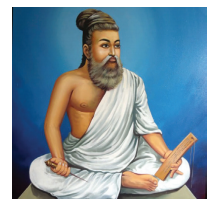
A large
part of Valluvar’s economic ideas are found in the second part of Thirukkural,
the porutpal. It deals with wealth. Thiruvalluvaris a fundamental thinker. He
believes that rains are the basic
support
of life. Since rain provides food, it forms the basis for stable economic life.
Agriculture which is the most fundamental economic activity depends on rain,”It
is rain that both ruins and aids the ruined to rise”.
a. Factors of Production
Thiruvalluvar
has made many passing references about the factors of production viz., Land,
Labour, Capital, Organisation, Time, Technology etc. He says, “Unfailing
harvest, competent body of men, group of men, whose wealth knows no diminution,
are the components of an economy”.(Kural 61)
b. Agriculture
According
to Thiruvalluvar, agriculture is the most fundamental economic activity. They
are the axle-pin of the world, for on their prosperity revolves prosperity of
other sectors of the economy, “The ploughmen alone”, he says “live as the freemen of the soil; the rest
are mere slaves that follow on their toil”(Kural 1032). Valluvar believes
that agriculture is superior to all
other occupation.
c. Public Finance
Thiruvalluvar
has elaborately explained Public Finance under the headings Public Revenue,
Financial Administration and Public expenditure. He has stated these as 1)
Creation
of revenue, 2) Collection of revenue, 3) Management of revenue 4) Public
expenditure
d. Public Expenditure
Valluvarhas
recommended a balanced budget. “ It is
not a great misfortune for a state if its revenues are limited, provided the expenditure is kept within bounds.” He
has given certain guidelines for a
budgetary policy. “Budget for a surplus,
if possible, balances the budget at other
times, but never budget for a deficit.”
Valluvar advocates the following main items of public expenditure: 1) Defence 2) Public Works and 3) Social
Services.
e. External Assistance
Valluvar
was against seeking external assistance. According to Kural No. 739, countries
taking external assistance are not to be considered as countries at all. In
other words, he advocated a self-sufficient economy.
f. Poverty and Begging
Valluvar
consideres freedom from hunger as one of the fundamental freedoms that should
be enjoyed by every citizen. According to him ‘poverty’ is the root cause of
all other evils which would lead to ever-lasting sufferings. It is to be noted
that the number of people living below poverty line, begging, sleeping on the
roadsides and rag picking in India has been increasing.
g. Wealth
Valluvar
has regarded wealth as only a means and not an end. He said, “Acquire a great fortune
by noble and honorable means.” He condemned hoarding and described hoarded
wealth as profitless richness. To him industry is real wealth and labour is the
greatest resource.
h. Welfare State
Thiruvalluvar
is for a welfare state. In a welfare state there will be no poverty illiteracy,
disease and industry. The important elements of a welfare state are 1) perfect
health of the people without disease 2) abundant wealth, good crop 4)
prosperity and happiness and 5) full security for the people.
2. Mahatma Gandhi
Gandhian
Economics is based on ethical foundations. In 1921, Gandhi wrote, “Economics
that hurts the moral well-being of an individual or a nation is immoral, and
therefore, sinful.” Again in 1924, he repeated the same belief: “that economy is
untrue which ignores or disregards moral values”.
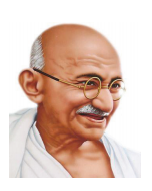
Salient Features of Gandhian Economic Thought
1.
Village
Republics: To Gandhi, India lives in villages. He was interested in developing the villages as
self-sufficient units. He opposed extensive use of machinery, urbanization and
industrialization.
2.
On
Machinery: Gandhi described machinery
as ‘Great sin’. He said that “Books could be written to demonstrate its evils… it is necessary to realize that
machinery is bad. Instead of welcoming machinery as a boon, we should look upon
it as an evil. It would ultimately cease.
3.
Industrialism: Gandhi
considered industrialism as a curse on mankind. He thought industrialism depended entirely on a country’s capacity to
exploit.
4.
Decentralization:
He
advocated a decentralized economy, i.e., production at a large number of places on a small scale or
production in the people’s homes.
5.
Village
Sarvodaya: According to
Gandhi, “Real India was to be
found in villages and not in towns
or cities.” So he suggested the development of self-sufficient, self-dependent
villages.
6.
Bread
Labour: Gandhi realized the dignity of human labour. He believed that God created man to eat his bread by the
sweat of his brow. Bread labour or body labour was the expression that Gandhi
used to mean manual labour.
7.
The
Doctrine of Trusteeship: Trusteeship provides a means of transforming the
present capitalist order of society
into an egalitarian one. It gives no quarter to capitalism. However, now India
experiences both casino capitalism and crony capitalism
8.
On the
Food Problem: Gandhi was against any sort of food controls. He
thought such controls only created
artificial scarcity. Once India was begging for food grain, but India tops the
world with very large production of foodgrains, fruits, vegetables, milk,
egg,meat etc.,
9.
On
Population: Gandhi opposed the method of population control
through contraceptives. He was,
however, in favour of birth control through Brahmacharya or self-control. He
considered self-control as a sovereign remedy to the problem of
over-population.
10. On Prohibition: Gandhi advocated cent per cent
prohibition. He regarded the use of liquor
as a disease rather than a vice. He felt that it was better for India to be
poor than to have thousands of drunkards. But ,now many states depend on
revenue from liquor sales.
3. Jawaharlal Nehru
Jawaharlal
Nehru, one of the chief builders of Modern India, was the first Prime Minister
of Independent India and he was there in that post till his death in 1964. He
was a great patriot, thinker and statesman. His views on economics and social
problems are found in the innumerable speeches he made and in the books he
wrote.
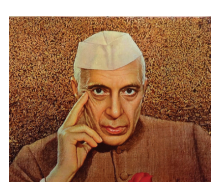
a. Democracy and Secularism
Jawaharlal
Nehru was a firm believer in democracy. He believed in free speech civil
liberty,adult franchise and the Rule of Law and Parliamentary democracy.
Secularism, is another signal contribution of Nehru to India. In our country,
there are many religions - Hinduism, Islam, Christianity, Buddhism, Jainism,
Zoroastrianism, Sikhism and so on. But there is no domination by religious
majority. Secularism means equal respect for all religions.
b. Planning
Jawaharlal
Nehru was responsible for the introduction of planning in our country. To
Jawaharlal Nehru, the Plan was essentially an integrated approach for
development. Initiating the debate on the Second Plan in the Lok Sabha in May
1956, Nehru spoke on the theme of planning. He said, “the essence of planning is to find the best way to utilize all resources of manpower, of money and so
on. ” Planning for Nehru was
essentially linked up with industrialization and eventual self-reliance for the
country’s economic growth on a self- accelerating growth. Nehru carried
through this basic strategy of planned
development. Nehru’s contributiontotheadvancementofscience, research,
technology and industrial development cannot be forgotten. It was during his
period, many IITs and Research Institutions were established. He always in
insited on “scientific temper”.
c. Democratic Socialism
Socialism
is another contribution of Nehru to India. He put the country on the road
towards a socialistic pattern of society. But Nehru’s socialism is democratic
socialism.
4. B. R. Ambedkar
B. R.
Ambedkar (1891-1956) was a versatile personality. He was the architect of the
Indian Constitution, a custodian of social justice and a champion of socialism
and state planning. Ambedkar’s writings included “Ancient Indian Commerce” (a
thesis submitted to the Columbia University for the award of the Mater of Arts
Degree in 1915), ‘National Dividend of India: A Historical and Analytical Study
(a thesis for which he was awarded Ph.D). His thesis was published as ‘The
Evolution of Provincial Finance in British India: A Study of the Provincial
Decentralization of Imperial Finance”.
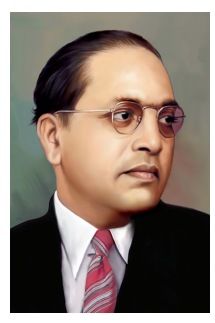
Ambedkar’s
thesis on “Provincial Decentralization of Imperial Finance in British India”
was accepted for the M. Sc degree in 1921. And his theis“ The Problem of the
Rupee” was accepted for the award of the D.Sc degree by the London School of
Economics in 1923. It is a miracle that RBI was conceptualized as per the
guidelines presented by Ambedkar in his book, “The Problem of the Rupee;Its
origin and its solution”. The main economic ideas of Ambedkar may be studied
under four broad headings:
1. Financial Economics
Much of
the work done by Ambedkar during his stay abroad mostly during the period
1913-1923, was in the field of Finance Economics. Ambedkar divided the
evolution of provisional finance into three stages:
Budget by
Assignment (1871-72 to 1876-77); (ii) Budget by Assigned Revenue (1877-78 to
1881-82); and (iii) Budget by Shared
Revenues (1882-83 to 1920-1921).
2. Agricultural Economics
In 1918,
Ambedkar published a paper “Small Holding in India and their Remedies”. Citing
Adam Smith’s ‘Wealth of Nations”, he made a fine distinction between
“Consolidation of Holdings” and “Enlargement of Holdings”.
3. Economics of Caste
Ambedkar
believed that caste was an obstacle to social mobility. It resulted in social
stratification. He was of the firm view that individuals must be free to change
their occupations. Moreover, the caste system caused social tensions. The caste
system has resulted in the absence of social democracy in India as distinct
from political democracy.
4. Economics of Socialism
Ambedkar
was a socialist. He was a champion of state socialism. He advocated the
nationalization of all key industries and suggested state ownership of land and
collective farming. He was for state monopoly of insurance business. Not only
that, he advocated compulsory insurance for every citizen.
There is
no doubt that Ambedkar was a great economist. But his academic work as an
economist was eclipsed by his greater contributions in the field of law and
politics. Above all he was a great social reformer.
5. J. C. Kumarappa
Joseph
Chelladurai Kumarappa was born on 4 January 1892 in Tanjavur, Tamil Nadu. A
pioneer of rural economic development theories, Kumarappa is credited for
developing economic theories based on Gandhism – a school of economic thought
he coined “Gandhian Economics”.
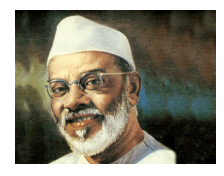
Gandhian Economics
J.C.Kumarappa
strongly supported Gandhi’s notion of village industries and promoted
Village Industries Associations. Kumarappa worked to combine Christian and
Gandhian values of “trusteeship”, non-violence and a focus on human dignity and
development in place of materialism as the basis of his economic theories.
While rejecting socialism’s emphasis on class war and force in implementation,
he also rejected the emphasis on material development, competition and
efficiency in free-market economies. Gandhi and Kumarappa envisioned an economy
focused on satisfying human needs and challenges while rooting out socio-
economic conflict, unemployment, poverty and deprivation.
Kumarappa
worked as a Professor of economics at the Gujarat Vidyapith in Ahmedabad, while
serving as the editor of Young India
during the Salt Satyagraha. He founded the All India Village Industries
Association in 1935; and was imprisoned for more than a year during the Quit
India movement. He wrote during his imprisonment, Economy of Permanence: The
Practice and Precepts of Jesus (1945)
and Christianity: Its Economy and Way of
Life (1945).
Several
of Gandhi’s followers developed a theory of environmentalism. Kumarappa took the
lead in a
number of relevant
books in the
1930s and 1940s.
Historian Ramachandra Guha calls Kumarappa, “The Green Gandhian,”
portraying him as the founder of modern environmentalism in India.
Kumarappa
worked for the Planning CommissionofIndiaandtheIndianNational Congress to
develop national policies for agriculture and rural development. He also
travelled to China, Eastern Europe and Japan on diplomatic assignments and to
study their rural economic systems.
6. V.K.R.V. Rao
According
to P.R. Brahmananda, “ the great trinityofpre-independent
and pos tindependent Indian
economists consisted of D.R.Gadgill, C.N.Vakil and V.K.RV. Rao. These scholars
were imbibed with a missionary zeal and analyzed the Indian economic problems
with a view to designing and propagating economic policies/programmes and plans
to India’s national advantage.” V.K.R.V: Rao was a prolific writer.
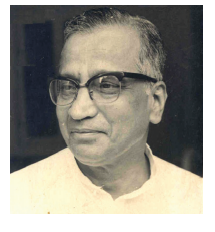
V.K.R.V:
Rao was deeply interested in three large themes. They were:
i.
National Income,
ii.
Food, nutrition and the distribution of good; and
iii.
Employment and occupational distributions.
1. National Income Methodology
As an
applied economist, Rao’s name is remembered for his pioneering work on the
enumeration of national income of India. Rao was a pupil of J.M. Keynes and he
of
H.W Singer considered V.K.R.V Rao as “ the best equipped of
all Keynes’ pupils. He attempted to develop the national income concepts suited
to India and developing countries generally; (ii) to analyze the concepts of
investment, saving and the multipliers in an underdeveloped economy; and (iii)
to study the compatibility of the national incomes industrialized and
underdeveloped countries. Rao’s paper on “Full Employment and Economic
Development” was one of the earliest contributions in the field of development
towards employment.
2. International Food Aid
Rao was
influential in creating ideas and shaping policy in the international attack on
world poverty, not only through his contributions to the question of
international aid and improved flows of external resources, but also through
his activities in the field of food aid.
3. Support for Socialism
During
the early phases of planning in India, Rao supported the case of a socialist
India, where the state would control the commanding heights of the economy and
the public sector would play a dominant role in economic development.
4. Rao’s Views on Industrialization
In his
pamphlet “What is wrong with Indian Economic Life?’ (1938), Rao gave the following
reasons for low per capita income and low levels of per capita nutrition in
India.
i.
Uneconomic holdings with sub-divisions and
fragmentation;
ii.
Low levels of water availability for crops;
iii.
Excess population pressure on agriculture due to
the absence of a large industrial sector;
iv.
Absence of capital;
v.
Absence of autonomy in currency policy, and in
general in monetary matters encouraging holding of gold.
5. Village Clusters
Rao felt
that rural communities had to be given a viable base.Therefore he suggested
that a cluster of villages should form a unit for rural development, so that
both social and economic interactions between villages could develop, and they
could effectively generate and fashion their own development with a more
meaningful participation by people.
6. Investment, Income and Multiplier
Rao’s
examination of the “interrelation between investment, income and multiplier in
an under developed economy” (1952) was his major contribution to macroeconomic
theory. As a thinker, teacher, economic adviser and direct policy maker,
V.K.R.V. Rao followed the footsteps of his great teacher, John Maynard Keynes.
7. Institution Builder
He
founded three national level research institutes namely Delhi School of
Economics, Institute of Economic Growth (both at Delhi) and Institute for
Social and Economic Change (Bangalore)
7. Amartya Kumar Sen
The Nobel
citation refers to Sen’s contributions to socialchoicetheory, d e v e l o p m e
n t economics, study on poverty and famines and concept of entitlements and
capability development (1998).
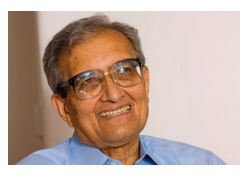
1. Poverty and Famines
Sen's
Poverty and Famines: An Essay on Entitlement and Deprivation” (1981) is both a
theoretical and an applied work. In the book, several famines have been studied
in the working of a general theoretical framework from an original angle. He
examined various meanings of poverty and drew attention to the incidence of
absolute and relative deprivation.
2. Poverty and Inequality
Sen has
carried out massive work on poverty and inequality in India. Sen’s major point
has been that the distribution of income/ consumption among the persons below
the poverty line is to be taken into account.
3. The Concept of Capability
The
concept of capabilities developed by Sen has been cited as a better index of
wellbeing than commodities or utilities. Capability, as defined by Sen, is the
ability to transform Rawlsian primary goods to the achievement of wellbeing.
4. Entitlement
Sen has
included the concept of entitlement items like nutrition, food, medical and
health care, employment, security of food supply in times of famine etc. He
considered famine as arising out of the failure of establishing a system of
entitlements.
5. Choice of Technique
Sen’s
‘Choice of Technique ‘ was a research work where he argued that in a labour
surplus economy, generation of employment cannot be increased at the initial
stage by the adaptation of capital- intensive technique.
Conclusively,
Amartyasen, more than just an economist, is an ethical philosopher. He is a
lover of freedom and a humanist. He has focused on the poor, viewing them not
as objects of pity requiring charitable hand–outs, but as disempowered
folkneeding empowerment, education,health, nutrition, gender equality,safety
net in times of distress; all are needed to empower people.
Related Topics